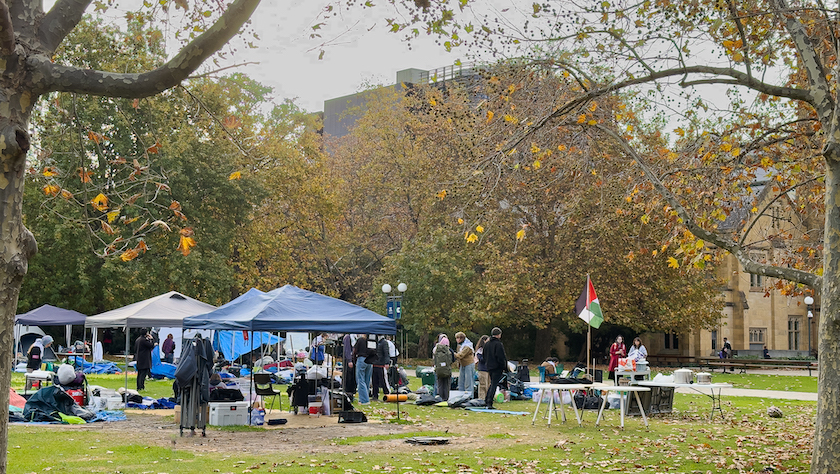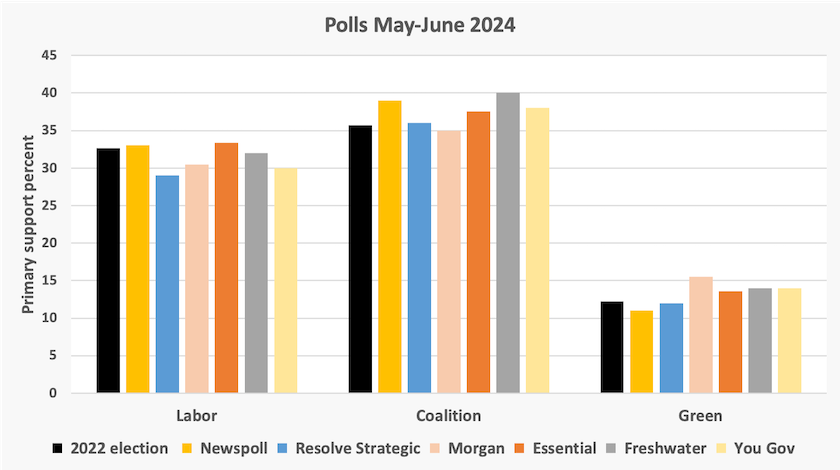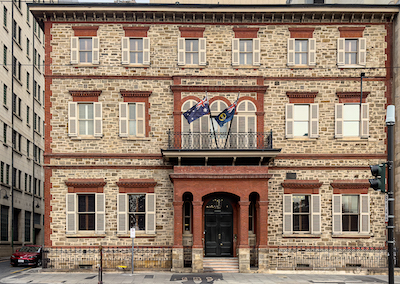Politics
Citizenship and immigration
Dutton is trying to use the government’s difficulties with immigration to claim a government scalp.
His opening salvo on immigration was in his budget reply speech. His arguments were muddled and confused, particularly when he tried to blame housing shortages on migrants, because he wasn’t engaged in a criticism of the government’s immigration policy. It is now clear that his aim is to force Albanese to sack Andrew Giles, the Minister for Immigration.
Abul Rizvi, former Deputy Secretary of the Department of immigration, has exposed the Coalition’s hypocrisy on immigration and border protection – Dutton’s abysmal record on immigration integrity in Pearls and Irritations and The Canberra Times – and its lies about Labor and Liberal deportation records in Independent Australia.
Giles has clearly been let down by his department, as Laura Tingle reports on the ABC’s 730 program: What the immigration minister's “direction 99” controversy tells us about the importance of a funded public service. She reminds us that Giles is served by a department rendered incapable of performing its functions because of severe understaffing and a purge of its experienced senior officers by the former minister, Peter Dutton. These are deep-seated problems exposed in the 2023 Nixon Review of the Department of Home Affairs immigration functions.
An account of the department’s ongoing problems is in a (paywalled) Saturday Paper contribution by Karen Barlow: What is happening in Home Affairs following Mike Pezzullo’s departure. Even when the department does manage to fill its vacancies, there is still the cultural misfit of a policy-oriented function, immigration, being absorbed into a large compliance-oriented organization. If the government is to be criticized it should be for not abolishing the Department of Home Affairs and returning immigration to its own department.
But Dutton wasn’t going to draw attention to the dysfunction in his own creation, and in any case his attack on the government is only incidentally concerned with immigration. The opposition is out to claim a political scalp, and Giles is the perfect target – a minister who has never mastered the dark arts of political bullshit and obfuscation, whose day-to-day powers are limited by the separation of legal and administrative functions, and who oversees a portfolio where bad stuff will always happen.
On the specific issues around “Direction 99” – the provision that has required weight be given to a person’s ties to Australia in decisions about deportation – the ABC’s Tom Crowley has a clear explanation of how the Administrative Appeals Tribunal has interpreted this direction, and how the government is re-writing directions.
The Coalition’s simple solution is that “Direction 99” should be revoked, but as David Speers reminds us, that direction harks back to a gesture of goodwill towards our closest neighbour, New Zealand. Can we deny any responsibility for the behaviour of people whose social and cultural conditioning, over a long period, has been in Australia?
In any case, Australia's problems in deporting serious criminals began well before direction 99 was implemented, points out the ABC’s Daryna Zadvirna. The government’s re-write of the rules – “Direction 110” – should “help things simmer down for now”, but the ssue of handling foreigners, whose criminality was “made in Australia”, has bugged previous administrations and will bug future administrations.
The politics of Dutton’s attack is explained in a 7am podcast by Paul Bongiorno. Dutton’s attacks haven’t relied on evidence, as may be revealed in an analysis of trends of AAT decisions, deportations, and other data. Rather he has described particular gruesome cases, making the country of origin of the perpetrators clear. Monique Ryan has questioned his use of this technique, suggesting that it’s a dog-whistle call to those who hold racist attitudes to immigration.
The real immigration issues are about skills and our economic structure
It’s unfortunate that Dutton’s confected tantrums, and the media’s obsession with the issue of Giles’ political position (including the ABC’s obsession), have overshadowed serious issues about immigration. The Grattan Institute has done a critical analysis of our skilled immigration program, concluding that we should re-design our points system so that it is more effective in bringing in people who will have high lifetime earnings, because these are the people who will make the strongest economic and fiscal contributions to Australia. (This is in contrast to the Coalition’s policy of seeing immigration as a means of suppressing wages.) Our points system is too focussed on correcting current specified skills shortages, and applies too much weight to people having been in Australia for study.
The Grattan Institute’s critique is summarized in a Conversation contribution (with a hyperlink to the main report) by its authors: How should the skilled migration points test be reformed?. The broader question of immigration numbers, including the Grattan Institute’s suggestions, is in an explanatory piece by the ABC’s Tom Crowley: The migration debate is heating up, but will the war of words lead to action?. Crowley explains the figures and the government’s policy directions, particularly its intention to see less use of temporary visas that become de-facto long-term visas.
The sources quoted by Crowley, including the Grattan Institute, are generally in favour of maintaining a high rate of immigration. There is not much support for the idea that suppressing immigration is the path to more affordable housing. Crispin Hull, one commentator who believes we should reduce immigration, does not endorse Dutton’s case for lower immigration, which he sees in terms of the Coalition’s tactic of putting superficially appealing solutions to complex problems, in the same way as he presents nuclear power to deal with climate change.
Citizenship: what does it mean to natives and immigrants?
So far the media has seen the “Direction 99” issue in terms of electoral politics and administrative convenience. If those people with criminal records had only taken out citizenship, they would be our problem, not New Zealand’s or some other country’s, and opportunists like Dutton would not have been able to feast on gruesome stories of their crimes.
Now we have the government offering fast-track paths to citizenship to people from certain countries who choose to join our armed services. There is clearly some confusion about the policy, as revealed in Richard Marles’ 10-minute interview on 730.

In both policies there are hints of some special relationship with New Zealand, but the government seems to be unclear about the extent we may also have some special responsibilities to people from other countries. Why, for example, are Canada, the US and the UK included in the armed services deal, but not Singapore, South Korea and Japan – countries with which we surely have more defence interests in common than we do with the UK? At first reading, and the way it may be seen in other countries, the armed services deal appears as if Australia is raising a white man’s army to defend against the yellow hordes.
We would find all this territory much easier to navigate if we had a clearer idea of the meaning of Australian citizenship. It shouldn’t be some “get out of deportation” convenience, or an incentive to join an undermanned army. We have a Citizenship Act, but how many people realize that citizenship involves a serious contract with the community? Our Act includes strong obligations – to share our democratic beliefs, and to respect one another’s rights and liberties for example.
Perhaps, so long as we legitimize loyalty to a foreign monarch, we will continue to muddle through with a poorly understood idea of what it means to be an Australian.
Dutton uses the Gaza war as a way to divide Australians

Democratic dissent, University of Melbourne
Sarah Schwartz is Executive Officer of the Jewish Council of Australia. It is refreshing to hear her, on ABC Breakfast, giving a cool-headed view on community tensions about the war in Gaza, where she acknowledges that there has been a rise in anti-Semitism, and states:
… we have also seen a huge rise in anti-Palestinian racism and islamophobia as well and we really need to tackle these forms of racism, by coming together as impacted communities, rather than what politicians are currently trying to do, particularly in the Coalition, which is attempting to drive divisions between Jewish communities and Muslim communities.
She is distressed by “the current rhetoric being used by the Coalition and then being adopted by many Labor politicians” which identifies opposition to the behaviour of the Israel army, or support for the Palestinian people, as anti-Semitism.
Independent MP Zoe Daniel, in an earlier Breakfast interview, notes that there has been unnecessary polarization over the war, as if our political leaders have to take sides, as the Coalition and the Greens have done: “I've had death threats”: Zoe Daniel on social cohesion.
She believes that in our public arena we seem to have lost the capacity to have a civilized conversation on these issues. Politicians and others will inevitably disagree, because the issues in this conflict are horribly complex. We need a way to talk about our disagreements without inflaming tensions. Accusations of anti-Semitism should not be used as a means to silence debate.
As Patricia Karvelas says in a descriptive post about “boiling point” tensions over the war in Gaza:
No political leader is responsible for the actions of individuals but the tone they set and the language they choose to use can have an enormous impact on what kind of country we choose to be.
Polls – the Coalition has gained, but they are a long way from enough support to win government
The latest polls, reported by William Bowe’s Poll Bludger, show a distinct improvement for the Coalition. On the highly-regarded Newspoll, the TPP outcome is now 50-50.

Taking the average of recent polls, the Coalition’s primary vote is up two percent on the 2022 election, The Greens’ vote is up one percent, and Labor’s is down one percent. Individual poll results are shown in the graph below.
Adding those figures up suggests that the Coalition’s two percent net improvement must have come from independents and others. For reasons to do with sample sizes pollsters cannot tell whether that gain is at the expense of parties on the far right, liberal independents (“Teals”), or others.
Accent Research, in association with Redbridge, has sampled 4 040 voters between February and May, and using Multilevel Regression with Post-stratification (look it up) has generated predictions for all electorates, albeit within a fairly large confidence interval for each one.
In line with the figures reported above, they find that there is little change in the parties’ support since the 2022 election. Labor’s primary vote is down a little, the Coalition’s is up a little, particularly in outer suburbs and in non-capital city population centres. But these swings do not point to any significant gain in representation for the Coalition. Based on this survey, the almost inevitable outcome is a Labor government, either in majority or in minority as equal possibilities . As for a Coalition majority, “there is almost no chance that the Coalition will win more seats than Labor and be the largest party in parliament”.
Their TPP predictions by electorate suggest there is little movement in the major parties’ vote. The Greens are down in inner and middle suburbs, while “other parties and candidates” are down in urban areas, but they are up elsewhere.
These most recent polls would pick up the reaction to the budget and Dutton’s immigration campaign, but they would not necessarily pick up the noisy conflict between the Greens on one side and a Coalition-Labor bloc on the other about the Israel war protests. In relation to that conflict the ABC’s Brett Worthington asks if the Greens may be the electoral beneficiaries, at the expense of Labor.
Also these polls were conducted before the Coalition re-ignited the climate war. The Coalition would be hoping that their climate non-policy will improve its support in outer metropolitan regions. It is hard to see it contributing anything towards winning back inner urban electorates.
Artificial intelligence
The Essential Report of June 4 has a set of questions about attitudes to artificial intelligence. Unsurprisingly most of us admit that we don’t know much about AI, and we are generally more alert to its risks than to its opportunities.
Older people (55+) are less likely than younger people to claim they understand AI, and are more concerned about its negative uses, but the age gradient is not particularly steep. There is no evidence of a young cohort that is wildly enthusiastic about AI.
Respondents are aware that AI will have significant impacts on workplaces. They believe governments and corporations should be obliged to help workers adjust to AI, and that workers should be compensated when their work is used to train AI.
Most responses are reasonably predictable, but one that stands out is 57 percent agreement with the statement “The government should take action to stop using AI to replace jobs”. That takes us back many years, to forecasts about the dire consequences if the government didn’t intervene to stop the proliferation of computers.
Frydenberg’s cameo reappearance on the electoral stage
One morning last week Josh Frydenberg was making a pitch for his old seat of Kooyong, lost in 2022 to independent Monique Ryan. By the afternoon the Josh for Canberra move, as the ABC’s Brett Worthington puts it, was over.
Worthington’s article goes into the issues around pre-selection, speculation as to whether boundary changes will make the seat easier or harder for the Liberals, and the problems of the gender imbalance in the Coalition’s ranks.
It s hard to imagine that this short-lived pitch resulted from some bright idea that came into Frydenberg’s mind during his morning shower. He’s more disciplined than that. There is almost certainly some message in this event. We may not know what that message is – perhaps there is some deliberate ambiguity – but we can consider some of the context of this move.
First, the Liberal Party is in terrible shape electorally. It holds only 25 seats in our 151-seat House of Representatives. The Coalition’s other 30 seats are held by the National Party (9 seats) and the Liberal-National Party of Queensland (21 seats). It seems that the 1987 Joh-for-Canberra campaign has finally succeeded: the Coalition has become a Queensland political movement – in fact a rural Queensland movement.
Second, Frydenberg was one of the most academically-credentialed members of Parliament. He must surely be dismayed when he observes the lack of intellectual depth on the Coalition’s front bench. In the Saturday Paper – Frydenberg tilt exposes Liberals’ skirmish (paywalled) – Paul Bongiorno explains how Frydenberg and his supporters probably assess the situation:
Does anybody seriously think that if Frydenberg actually made it back into the parliament and Dutton lost the election, he would be content to be shadow treasurer to Angus Taylor or anyone else as leader?
Third, he is descended directly from Hungarian Jews who fled from the Holocaust. He would be more aware than most members of Parliament of the ways the authoritarian extreme right is able to gain a foothold in democracies. Dutton is showing worrying signs that anyone familiar with European history would recognize. He has plainly said that he sees Parliament as a disadvantage for government, and in his role as opposition leader he has adopted the tactics of Trump and other populist strongmen on the far right.
Vale Steele Hall
Former South Australian Premier Raymond Steele Hall died on Monday, aged 95. He served only one term as state premier, from 1968 to 1970, but it’s because of the brevity of that term of office that he should be remembered as a person of honour and political courage.
The 1968 election was a rigged contest, as had been the case in many preceding elections. The long-ruling Liberal Country League (similar to today’s LNP in Queensland) had constructed an electoral map with much larger urban working-class electorates than rural and prosperous urban electorates. Because it was a biased distribution rather than a gerrymander, it was called a “Playmander” after former LCL Premier Thomas Playford, who had held office for 27 years until 1965.
After a brief period in which Labor held government, in spite of the Playmander, in the 1968 election Labor won 52 percent of the vote, but that was insufficient to achieve office in this rigged system. The LCL’s Steele Hall became premier, and during that term in office he deliberately pushed through Parliament an electoral redistribution, evening up the number of voters per electorate, a move he knew would see the LCL defeated. As it surely was in the 1970 election which saw the progressive Don Dunstan again become the Labor premier.

Adelaide Club – where they kept the LCL
Steele Hall resigned from the LCL, and with a handful of followers formed a centrist party known as the Liberal Movement, which helped the Dunstan government push further democratic reforms through the state Legislative Council. In 1974 Steele Hall was elected to the federal Senate, where he had a moderating influence, trying to dissuade Coalition members from blocking supply to the Whitlam government.
The ABC’s Rory McClaren and Sara Green have a short obituary on the ABC website. There is a longer account of his political life on the federal Senate biographical dictionary.
The forces he stood up to in the 1970s were the politically conservative remnants of the South Australian establishment. Is there anyone in the Liberal Party today, among the so-called “moderates”, with the courage to follow Steele Hall’s example and stand up to the far more dangerous forces in the Coalition who seek to take Australia down the path of political division. populist authoritarianism, and slow economic decline?